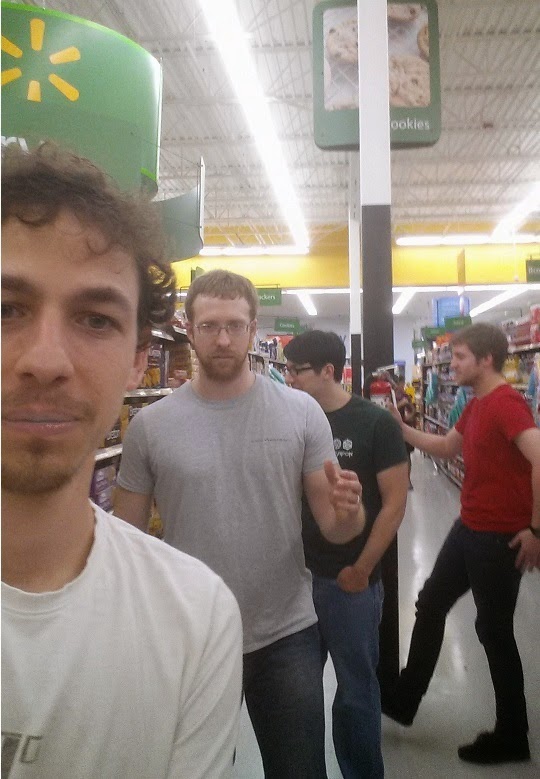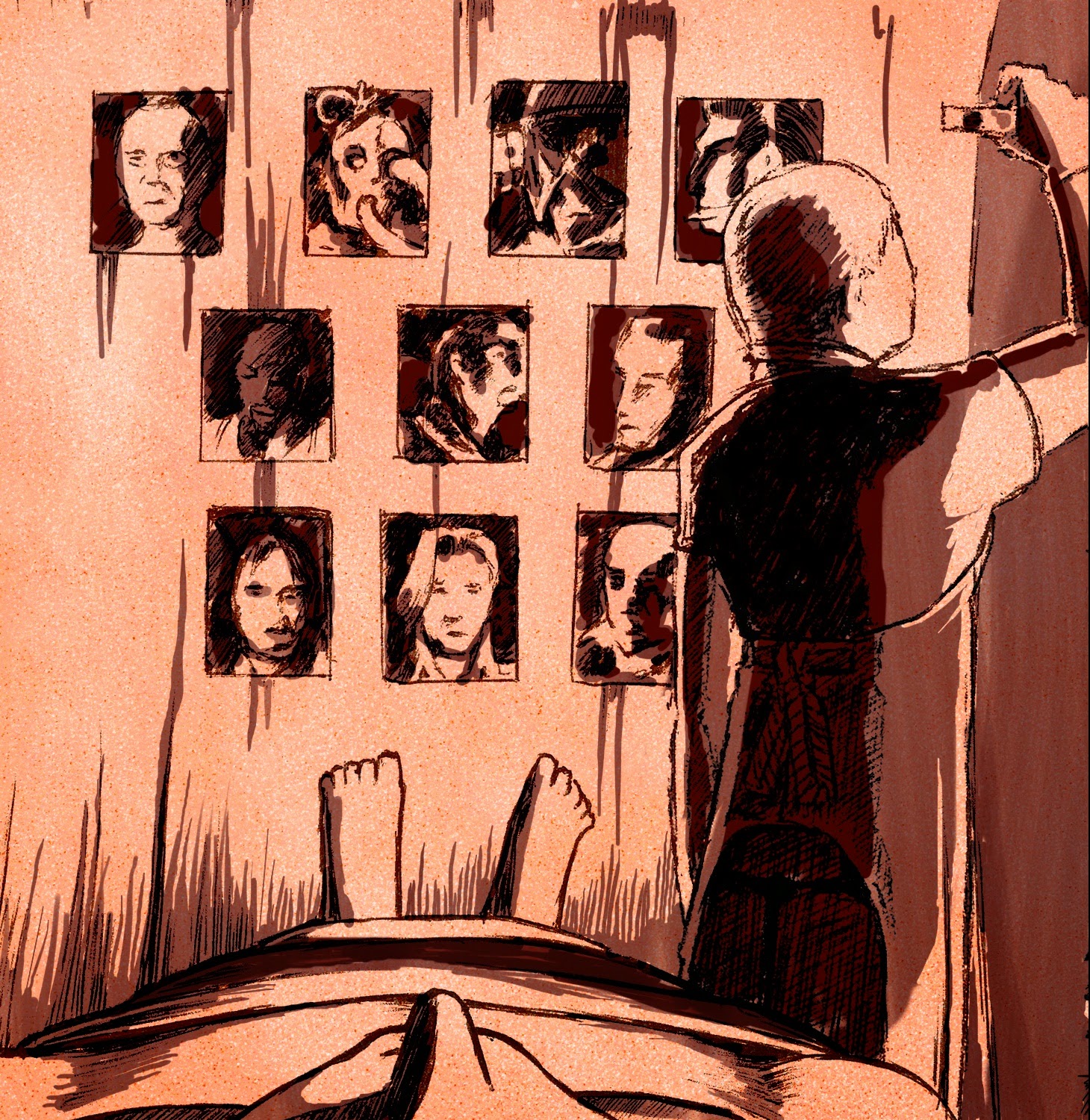 |
| Art by AdamOne (the 3rd) Cartwright |
We originally intended it to be sort of a "best/worst of Dwelling of Duels entries, plus the Dexter vs Layton song", but the more time we put into arranging the Dexter song, the more months of DoD we entered (which took away from arranging the title track), and the more track ideas Juja and I had for recording and including on the album... We just sort of had a bunch of fun ideas of “oh, let’s do this”, which is how we normally operate, and worked towards recording those songs, quickly bringing an 8 track album to 17 tracks, to 20. It didn't help that Juja was also helping me record tracks for original songs I was working on as well. We were busy guys, just having fun putting together music, learning more about recording techniques with each passing month. At one point I got Juja a better interface so he wouldn't have to record with a 3 second delay, and got myself a really nice headset so I could get an accurate feel for the music we were mixing. I also learned how to program drums, making my first attempt on a Puzzle Theme, but eventually getting pretty alright at it. I also learned a lot about editing, pitch correction, and mixing/mastering while experimenting on this project over the years.
 |
| Picture of the 36 hour recording rig |
There was another huge
delay in starting our album, the acceptance of Careless Juja live to
Nerdapalooza, which in itself was
an immense undertaking, but I already had most of my parts of the album
recorded, and it would be good practice for the dreaded Layton solo, so I
didn't see it as such a bad thing. In short, Adam (the artist), Juja, Helios,
and a half dozen other musicians played some of our songs in a live setting. It
was awesome and it was about this time that we hired Brandon
Strader (who wrote his
own version of the making of the this album here),
a really talented guy we knew from DoD and from his album called Random
Encounter (which I'd discovered while looking up my band on google). He seemed
fairly approachable, so we tried to get him to help us arrange, mix, and master
our title track, which needed to sound amazing... But in working with the guy it
was really clear to Juja and myself that he understood what we were about, that
he's really talented, and that he was just as passionate about our music as we
were. While we didn't intend to outsource mixing our entire album, he was a lot
more talented than us, extremely friendly, and open to the idea. Now, instead
of simply re-releasing DoD tracks on an album, we'd be properly mixing them,
re-recording parts, editing others, and really making every
track sound as good as possible. Strader finished arranging the Dexter
theme while Juja and I worked on the logistics of the live show.
 |
Careless, Helios,
Juja, and Ben (my nephew) at Walmart…
Shortly before the
Nerdapalooza show
|
After the Nerdapalooza
show, thanks to a mix of Strader's enthusiasm and the good vibes we got from
playing the show, Juja and I immediately got to recording. I had just picked up
a new recording technique called "recording with dynamics", which
made my accordion sound significantly better than any previous method of
recording, so though it was really unenjoyable to do, I felt it was right to go
back and literally re-record many of the songs I'd spent the last 2 years
recording... Including the dreaded Professor Layton solo that literally look me
3 months of daily practice to perfect, and 6 hours to record the perfect take.
Sort of like the salmon commercials boasting that they "endure the worst
to bring you the best", during the making of this album I broke two
accordions (reeds popped out, mics broke), my home completely flooded with 2+
inches of water, twice, my water-pump system & AC broke the same day during
the start of my big 4 day "heat-wave recording session" (no AC and no
water to the building for 4 solid days of recording), the piano broke 4
additional keys when I started to record the touch-ups to Helios' parts, the
computer with all the recordings for the entire album died, the backup hard
drive with all the recordings was physically dropped (by me, carelessly down a
flight of stairs) and destroyed immediately after the file transfer, there were
technical failures at just about every recording session, everyone involved
caught some pretty intense sicknesses, and Strader's car was shot with real
gunfire after two of his neighbors got into a scuffle and decided to kill one
another... I'm sure there are worse horror stories out there for album
creations but I just wanted to illustrate the literal blood, mucus, sweat, and
tears rendered into the tracks of this album.
 |
| Careless Juja |
Around Nerdapalooza we
hosted a Kickstarter, got lots of help from 8bitX and Nerdapalooza advertising
it, and reached our goal in the final hours. I really can't emphasize that
without the help of our Kickstarter backers we really couldn't have afforded to
put the album together... While putting together a track listing a few weeks
later, as we looked at a 35+ track album, we deduced that the average Compact
Disc can only hold 70 minutes of music, and that we'd promised to deliver all
of the 35 songs. It didn’t take Professor Layton to tell us that we needed to
change what we had a problem on our hands… I firmly believed that a two disc
Layton album would be a bad idea because I felt the Dexter vs Layton theme
wasn't dynamic enough (we didn't have enough music from Layton and didn't want
to add more songs as we were already behind schedule) for an epic 2 CD's of music.
We also didn't think that people would want two back-to-back discs of our music
and didn't have any new ideas for additional album art that fit the theme.
Still, we wanted to make sure that all our backers got everything we promised,
so in the end I came up with a pretty interesting idea for another album
concept, which we could work on after Juja, Strader, and I finished the Layton
album.
 |
| Interior Album Art |
After the recording
phase was complete in April (it took a lot of time to coordinate our efforts
with the various guest drummers/artists), Juja and I were fairly burnt out (I
also juggle Random Encounter, a half-dozen musical collaborations, and Juja
works on other music projects too), so we took a breather of sorts while Strader
worked his magic... Well, that’s actually sort of a lie... I was working with
my good friend Peter Pepper to write the script for the "other
album" while Juja and myself were arranging/recording songs for it. In
early June, we got a message from Strader saying he was almost done and we
spent the entire weekend of June 14th in back and forth conversations in a
three way chat, listening to tracks, finalizing, and tweaking the entire album.
It was at this point that we decided to throw in the Punch Out song, because it
sounded good and Juja had jokingly posted the song to the Careless Juja
facebook page as “something that has nothing to do with the Layton album.” This
is also where Strader went from “really awesome mixing guy” to “really insanely
awesome mixing guy” in my books.
 |
| Victory picture from the Airport Terminal I slept in |
During that weekend I
realized that I’d forgotten to record the intro jingle to our intro track and
recorded it using the musical typing feature (literally using my computer's
keyboard) while on a flight from Atlanta to Boston. I got a bunch of looks from
other people on the plane... Also, at the last possible minute of the final
day, Juja informed Strader and I that the intro piano bit in the Layton song
was completely wrong... He had apparently transcribed it wrong years ago and had
forgotten to fix it. Luckily Strader is a super chill guy and literally 6 hours
before the final mixed/mastered tracks were to be submitted to the CD printing
company, I recorded the updated version of the piano tracks, he mixed them in,
and they made it into the final cut.
I write all of this
before the album has been released, little over a week before our album
premiere/release/listening party on 8BitX.com [update: posted 1 day before the release], before anyone besides the three of
us has really heard any of the tracks, and I'm unsure how our album is going to
be received… I do know that I'm proud of our new album, that we probably
couldn't have made it any better. My personal goal of creating & releasing
these songs to the world has been a success, so I am without regret, though
admittedly it would be cool if people beyond us enjoy this too. Juja and
Strader are of a similar mindset, and we sincerely hope you enjoy our latest
creation: Professor Layton & the Bay Harbor Butcher.








.bmp)































